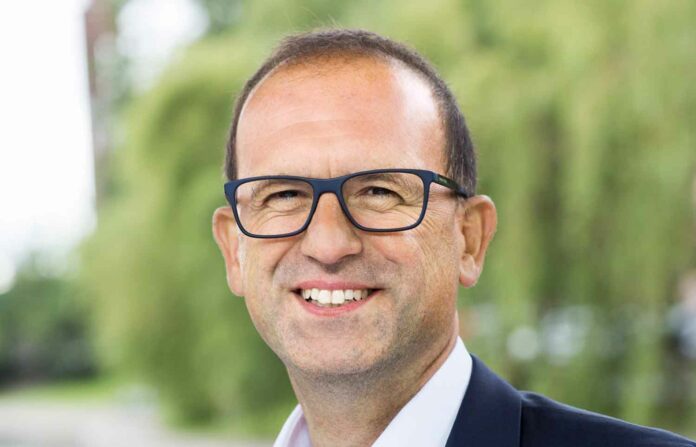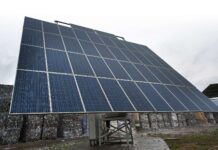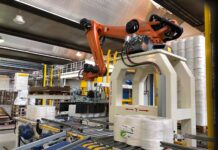The circular economy, tissue from wheat straw, a dual strategy of private label and brands: TWM Senior Editor Helen Morris interviewed Donato Giorgio, President Global Supply Chain and member of the Executive Management Team, Essity.
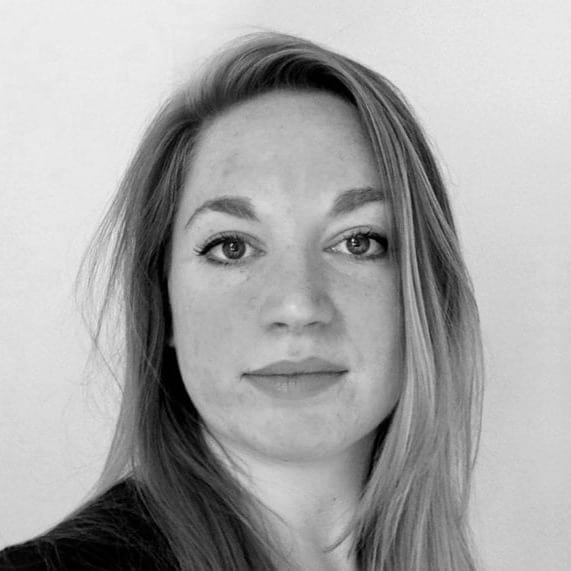
Donato Giorgio’s enthusiasm for his job shines through the computer screen during our interview for TWM’s Germany Country Report. The Global Supply Chain President of Essity – consumer tissue’s second global player – is discussing at length his determination and excitement to help bring the circular economy to the tissue industry, and just how the company will achieve that by using agricultural by-products to produce tissue at its Mannheim plant in Germany. “This is the future, and we believe this is what the world needs,” Italian-born, Germany-based Giorgio says. “A few years ago I went to Essity’s board of directors to say: ‘We’re putting several ideas together for something that’s never been done before in the tissue industry… we will need an industrial plant… and I will need €40m. Actually, it may be more than €40m, and it may only start-up in two years’ time. But it will be the greatest thing we as an industry do in the next five years – so give us a chance.’ And they supported it. This tells you that Essity has the courage to lead change.”

Announced in May 2019, Essity has invested SEK 400m in its integrated
tissue plant in Mannheim. It is one of a kind, and that ambitious initiative is currently being started up at the time of going to print with an initial run of 35,000pty. It will produce pulp based on alternative fibre taken from plant-based agricultural by-products. In Mannheim’s case, that by-product is wheat straw.
What gives the process wider significance is its localised potential. If the initiative is rolled out globally, other by-products located close to sites could be involved. Essity has secured the rights to a new proprietary technology to produce what it says is a sustainable alternative pulp from wheat straw, and the process is expected to reduce the use of water, energy and chemicals, while the by-product of the integrated pulping process can also be refined and used as a substitute for oil-based chemicals.
The final tissue product will be marketed in Germany under Essity’s Zewa brand, and Giorgio says it will be of the same quality as conventional wood-based pulp tissue products – and available to consumers at the same cost. It is, he adds, a project that could change the course of the tissue industry’s future.
Giorgio has spent 11 years with Essity, having started his career as a Process Engineer at Proctor & Gamble (P&G) in Italy over 20 years ago, and then working at P&G in Germany, Italy and the USA. “Europe really needs to step up and support innovation. As an industry, we need to work on something that gives the consumer a high-value experience, but which is also working on the affordability of the process in terms of capital, energy and water,” he says.
When he started his career, he says standard toilet paper was 2ply, Essity’s Lotus was 3ply, and any developments and innovation back then meant tissue products just became 4ply or 5ply. “If someone in the world doesn’t come up with something new, in 20 years we’ll have a 10ply toilet paper! If you look around the world at the increased rate of use of hygiene in regions such as China, Africa, Latin America, hygiene use is still rapidly increasing. But as an industry, we just can’t carry on producing tissue with the same type of raw material with the same type of technology as we currently do. There is simply not enough supply for demand. When countries like China arrive at even half of the consumption per capita of Europe and the US, it is not manageable. It’s not manageable in terms of energy and water and capital.”
His own personal mission alongside Essity’s is to make tissue products more readily available, with enough raw material to meet growing demand: “Parts of the world now are missing easy access to hygiene, and they need €500m for a small tissue plant and then a massive infrastructure of electricity and water. And of course, these are high-density populations, but many countries just can’t build supporting mills. So in the future, we believe there needs to be a tissue process production that is more similar to personal care production: a small, affordable, energy-efficient manufacturing flow. This still needs to be invented, and Essity needs to do it.”
At Mannheim, the company partnered with an American start-up company and combined this new technology of processing straw together with its knowledge of integrated papermaking and recycling to create “something that doesn’t exist in the world,” Giorgio says. “I am extremely excited about it. It’s a really true innovation, something that has never been done before. Mannheim will show the world that there is an alternative way to produce tissue. Development needs to meet need, and while virgin fibre isn’t wrong if it’s taken from certified sources, the world will still need an alternative source of agricultural waste, especially to meet the increasing consumption demand in China.”
Mannheim is starting with straw because that region along with Poland is “full of straw”. “But we can use this with any kind of agricultural waste. When we move eventually to Latin America, we’ll use the local cultural waste there.
“Everyone is speaking these days about electrical cars, but you can live in Africa or China without an electrical car. However, people will always need hygiene. When we have evolved hygiene production to the circular economy, then we will have given the biggest possible contribution to the planet.”
The potential is made even clearer with a glance at Essity’s global footprint: 17,000 employees in the company’s global supply chain and 4.2m tonnes of capacity spread across 54 production sites in 19 countries.
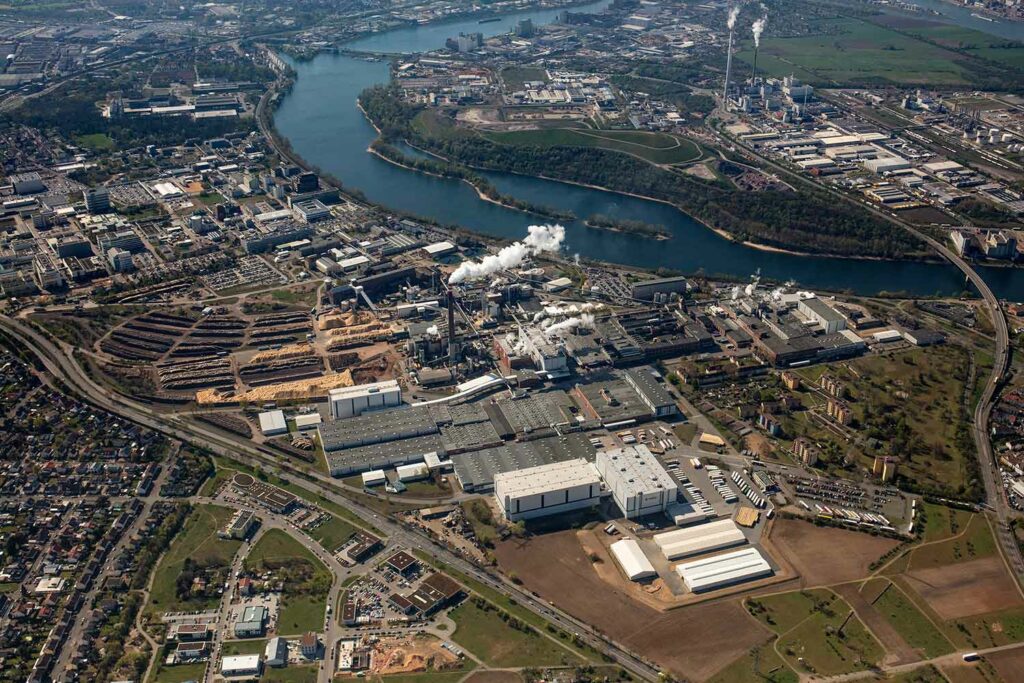
Germany will remain a crucial sector for the business with its three consumer tissue sites in Mannheim, Neuss and Witzenhausen, as well as a dedicated AfH plant in Kostheim. The country’s 580,000 tonnes of capacities are produced on 11 PMs, 53 converting lines and by 2,300 employees in tissue production.
A significant change of strategy for Essity’s European division was announced in the company’s half year results on 16 July. The creation of a Consumer Tissue Private Label Europe division is underway in its Consumer Tissue business area and will consist of 1,700 employees and seven production facilities, one in Belgium, two in France, three in Italy and Germany’s Witzenhausen plant. The division is expected to be up and running by the end of 2021.
Georgio says the move will further consolidate the company’s presence in the marketplace. “What we have managed compared to our competitors, starting six years ago with the ‘Tissue Roadmap’ – actually, starting with SCA 30 years ago – is creating value out of tissue. We had a very scattered footprint. With the Roadmap we made a lot of right steps to make sure we are homogeneous, with a well-defined footprint.”
Part of that consolidation has also included the realignment of some of Essity’s production, with the closing of some factories and shutting down of capacity across Europe. “We wanted very well invested and productive factories, some of which were designed for innovation,” he adds.
Heading into 2022, he adds that the new private label division and realignment of production will create a division that is “self-sufficient, and well equipped to win in the private label market.” Seven plants will be dedicated to the so-called pure product label for tissue, which are stocked mostly in discount supermarkets. “To be winners in these areas is different from being winners in the area of the brands,” he says. “Our division will have a big impact in countries like Germany where you have the big discounters. We are very proud and excited about this because it’s another innovative and novel way for Essity in creating value in tissue.”
He adds the business has been very successful in the last year with the dual strategy of private label and brands at 60/40, and the new private label division will make it 50/50 private label and brands: “This is another step to better serve the customers for their specific needs and create value and not destroy value. In the future there’s space for private label and brands.”
Private label “became big in Germany and across the world because if you are a commoditised, non-innovative industry, of course private label is the right thing. But when you bring in innovation, branded is the right thing. It brings a lot of consumer and customer-relevant insights and innovation power. So we see big opportunities for branded in tissue in the future, starting from sustainability for a circular economy as well as for customer and consumer convenience.”
The world of tissue, he emphasises, needs innovation in many areas, starting from sustainability: “Consumers are very positively sensitive on this, especially the young generation who want to buy something that is in-line with the circular economy, but that equally doesn’t cut quality or cost more money.”
At Mannheim, he says the company will do something “fantastic for the planet”, that will also produce a high-quality tissue product which won’t cost more. “We will take agricultural waste, make pulp that goes directly to the machine to produce high quality tissue. The lignin can be used to replace plastic and it can be used in the mining industry, in the food industry, or use polymers for making film … so the tissue factory of the future will be like a pod. You don’t waste anything. You take one tonne of agricultural waste. You don’t waste anything. You take one tonne of agricultural waste and you make tissue, and eventually you can even make the packaging for it. It is bio based, biodegradable, compostable and recyclable. We deeply believe the tissue industry needs to be disrupted, and this is a real circular economy. It’s the role of Essity in tissue.”
On 16 July, the business also announced the step to become carbon neutral by 2050: “This means we are committed to evolve this industry to the circular economy. We are disrupting linear manufacturing and make it circular. We are also projecting intense work on paper machines to re-use the CO2 load of the PM process.”
“I have been in the tissue industry for more than 20 years and Mannheim is the single biggest new thing I have seen. We are starting as we speak, the first unique plant in the world that produces high-quality tissue out of agricultural waste. I am incredibly proud of this, and it will be one of the main contributions I leave with my own personal footprint for the planet. This has never been done before in the world, which tells you a lot about our determination to bring the circular economy to tissue. The proof will be in the pudding, as the British say.”
And with that, Donato Giorgio comes full circle.





















